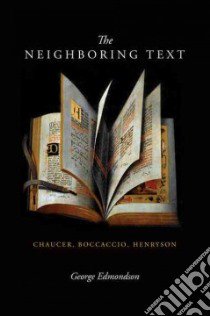The Neighboring Text - 9780268027759
Un libro in lingua di George Edmondson edito da Univ of Notre Dame Pr, 2011
- € 42.50
- Il prezzo è variabile in funzione del cambio della valuta d’origine
Most medieval texts were not really texts in the modern sense of printed, bound, stand-alone volumes, but were instead scribal productions that circulated in manuscript form, often alongside unrelated writings, thereby producing what seem to be haphazard compilations. In The Neighboring Text: Chaucer, Boccaccio, Henryson, George Edmondson argues that we have tended to apply a vertical, linear model of literary history to this late medieval manuscript culture. By contrast, he brings recent work in the fields of psychoanalysis and political philosophy to bear on the question of literary history in order to develop a countermodel informed by a horizontal ethos of "neighborliness."
Edmondson analyzes the different ways that three canonical texts--Chaucer's Troilus and Criseyde; its source, Boccaccio's Il Filostrato; and its fifteenth-century Scottish derivative, Robert Henryson's Testament of Cresseid--treat two figures, Troilus and Criseyde, and how those differences affect our understanding of literary history. He argues that what makes them neighboring texts is their shared concern with the subject of medieval Trojan historiography in general, and their very different treatments of Troilus in particular. At the same time, Edmondson supplements the medieval ideal of neighborliness with the psychoanalytic understanding of the neighbor as a figure both proximate and strange: at once the building block of community and its stumbling block. The result is a repositioning of the three works as a textual neighborhood--one in which the legendary history of Troy is transformed from the basis of imaginary national genealogies to a figure for the aggression and enjoyment, the conflicting gestures of identification and estrangement, that shape the neighbor relation.
"George Edmondson has authored a major intervention into medieval cultural studies. A brilliant work of criticism, The Neighboring Text reconfigures how to think about textual relations, opening a space where meanings unfold through contiguity rather than filiation of influence. The book deploys a historically sensitive psychoanalytic mode of analysis that foregrounds the place of the ethical within literary analysis. The Neighboring Text is as beautifully written as it is persuasive." --Jeffrey J Cohen, George Washington University
"In The Neighboring Text, George Edmondson offers a compelling new model for conceptualizing literary relations, and impressive new readings of a crucial set of texts. In Edmondson's deft hand, the neighbor emerges as an important figure for relatedness, one pliable enough to compass historical, spatial, affective, or ethical modes. Immensely exciting and utterly absorbing, his study infuses new life into questions of literary inheritance and historiography that we have long thought settled." --Patricia Clare Ingham, Indiana University
"George Edmondson's book marks an innovative and promising approach to the Chaucerian tradition of Trojan historical fiction. This is an incredibly smart and compelling book. Its central idea about reconfiguring genealogical relations between texts into 'neighbor' relations that can complicate the normally linear ideas of cause-effect-revision extends our historical understanding of medieval texts and invigorates a field that threatens to become a rigid and stultified scene of reading." --Elizabeth Scala, University of Texas, Austin
"This is the most important recent reconfiguration of medieval English literary history. Edmondson's book reanimates both a rigorous psychoanalytic method and the question of what Chaucer did to Il Filostrato. It not only demonstrates that Boccaccio, Chaucer, Henryson, C. S. Lewis, David Wallace and Aranye Fradenburg belong in the same neighborhood but that its smart and urgent thinking about what it means to be a neighbor could open valuable new real estate in medieval literary studies generally." --D. Vance Smith, Princeton University
Informazioni bibliografiche
- Titolo del Libro in lingua: The Neighboring Text
- Sottotitolo: Chaucer, Boccaccio, Henryson
- Lingua: English
- Autore: George Edmondson
- Editore: Univ of Notre Dame Pr
- Collana: Univ of Notre Dame Pr (Paperback)
- Data di Pubblicazione: 15 Maggio '11
- Genere: LITERARY CRITICISM
- Argomenti : English literature Middle English, 1100-1500 History and criticism Theory, etc English literature Old English, ca. 450-1100 History and criticism Theory, etc Transmission of texts England History To 1500
- Pagine: 280
- ISBN-10: 0268027757
- EAN-13: 9780268027759


